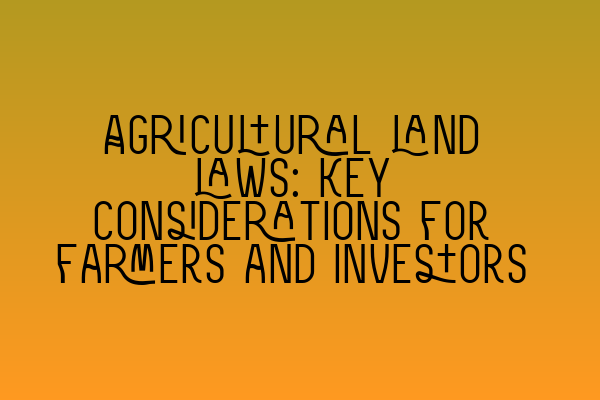Agricultural Land Laws: Key Considerations for Farmers and Investors
Agricultural land plays a crucial role in the economy, providing a vital source of food and supporting rural livelihoods. For farmers and investors interested in agricultural land, understanding the key legal considerations is essential to navigate the complexities of this sector.
1. Planning and Land Use Regulations
Before purchasing or utilizing agricultural land, it’s important to consider planning and land use regulations that may affect your operations. Familiarize yourself with local zoning laws and regulations to ensure compliance and avoid potential legal issues. SQE Property Law & Land Law can provide guidance on these matters and help you navigate planning applications and appeals.
2. Tenancy Agreements and Leases
If you are a farmer looking to rent agricultural land, entering into a tenancy agreement or lease is a common practice. These agreements outline the rights and obligations of both the landlord and the tenant. It’s crucial to understand the terms and conditions, including rent, duration, and maintenance responsibilities. SQE Property Law & Land Law can assist in drafting, reviewing, and advising on tenancy agreements and leases to protect your interests.
3. Environmental Regulations
Environmental regulations play a significant role in agricultural land management. Familiarize yourself with laws related to soil erosion, water pollution, pesticide usage, and waste management. Stay updated on changes in regulations to ensure compliance and mitigate environmental risks. SQE Property Law & Land Law can provide advice on environmental compliance and assist in navigating environmental impact assessments.
4. Access Rights and Easements
Access to agricultural land is a crucial consideration, especially in cases where land is divided into different plots or surrounded by other properties. Understanding access rights and easements is essential for farmers and investors to ensure access to their land and avoid unnecessary disputes. SQE Property Law & Land Law can help clarify access rights and negotiate easements to provide certainty and protection.
5. Succession Planning
For farmers and agricultural land investors, succession planning is an important aspect to consider. Planning for the transfer of ownership or management of the land to the next generation can help ensure the continuity of operations and protect your legacy. SQE Property Law & Land Law can advise on succession planning, including wills, trusts, and other estate planning tools.
6. Dispute Resolution
In the event of disputes related to agricultural land, having access to legal representation is crucial. SQE Property Law & Land Law can provide expert advice and representation in disputes arising from tenancy issues, boundary disputes, environmental claims, and more.
By understanding and navigating the different legal considerations surrounding agricultural land, farmers and investors can make informed decisions and protect their interests.
If you require legal assistance or advice on agricultural land laws, SQE Property Law & Land Law is here to help. Contact us today to discuss your specific needs and find out how we can assist you.
Related Articles:
